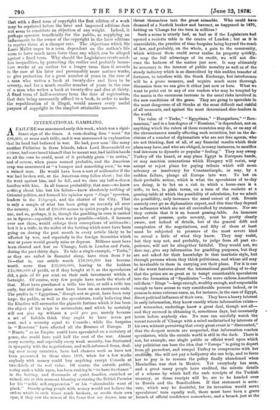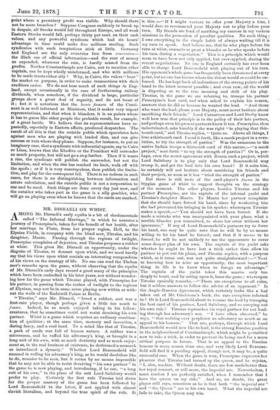INTERNATIONAL GAMBLING.
AFAILURE was announced early this week, which was a signi- ficant sign of the times. A corn-dealing firm "went" for £90,000, or some such trifle, and it was announced in explanation That its head had believed in war. He had, poor man ! like many another Philistine in these Islands, taken Lord Beaconsfield au serieur, had convinced himself that he meant war, had laid his hands on all the corn he could, most of it probably grain " to arrive," and of course, when peace seemed probable, and the American crop was announced as " a bumper and something over," he was a rained man. He would have been a sort of millionaire if the war had broken out, or the American crop fallen short ; but the die went against him, and he fell, and we dare say half-a-dozen families with him. In all human probability, that man—we know nothing about him but his failure—knew absolutely nothing of Oriental politics, and formed his opinion upon " Jingo" speeches, leaders in the Telegraph, and the chatter of the City. That is only a sample of what has been going on recently all over the country. A bet of £90,000 seems to quiet people a good big one, and so, perhaps, it is, though the gambling in corn is carried on in figures—especially when war is possible—which, if farmers ever saw them, would enlarge their conceptions of arithmetic ; but it is a trifle, in the midst of the betting which must have been going on during the past month in every article likely to be affected by war, and especially in the foreign Securities which war or peace would greatly raise or depress. Millions must have been cleared and lost on 'Change, both in London and Paris, during the past thirty days. To take a single example, " Turks," as they are called in financial slang, have risen from 9 to 16—that is, one article worth £18,000,000 has become worth more than £33,000,000, leaving to the holders £15,000,000 of profit, or if they bought at 9, as the speculators did, a gain of 60 per cent. on their cash investment within a fortnight. Of course, very few people have made the whole of that. Most have purchased a trifle too late, or sold a trifle too early, but still the gains must have been on an enormous scale. The profits in " Egyptians," though not so great, have been very large, the public, as well as the speculators, really believing that the Khedive will surrender the gigantic fortune which it has been the object of his reign to accumulate, and which he certainly will not give up without a quid pro quo, merely because a set of Infidels think they ought to have seven per cent. and a security equal to Consols ; while the bargains in " Russians " have affected all the Bourses of Europe. If " Russia" as an Empire could have speculated on a certainty of peace, she could have paid half the cost of the war. Almost every security, and especially every weak security, has fluctuated in sympathy with the negotiations, and well-informed firms, deal- ing over many countries, have had chances such as have not been presented to them since 1848, when for a few weeks anybody with money could buy anything except Consols at two-thirds of its real value. Of course the outside public, seeing such a table open, has been rushing in "to have its chance" in the betting. and thousands of quiet families, enriched or ruined, are at this moment blessing or cursing the British Premier for his "noble self-suppression" or his "abominable want of pluck." Steady-going people with money would not believe the orders which in such times reach brokers, or credit their own eyes, if they saw the names of the firms that are drawn into or
thrust themselves into the great scramble. Who could hive' dreamed of a Norfolk banker and baronet, as happened in 1870, betting on 'Change for the turn in millions ?
Such a scene is utterly bad, as bad as if the Legislature had opened a roulette table in the centre of London ; but as it is unavoidable, the practice of time-bargains being beyond the reach of law, and probably, on the whole, a gain to the community, which without them could never realise its property quickly, or reap the full advantage of its credit, we will not dis- cuss the badness of the matter just now. It may ultimately be necessary in the interest of public morality as well as of the steady industry which is so discredited by this sudden transfer of fortunes, to interfere with the Stock Exchange, but interference will be a grave measure, and require much more thorough discussion than we can give it either just now or here. What we want to point out to any of our readers who may be tempted by the mania is the enormous increase in the usual risks involved in the new conditions of the game. They are going to speculate in the most dangerous of all Stocks at the most difficult and riakful. of all moments, and against the most determined dice-loaders in the world.
The value of " Turks," " Egyptians," "Hungarians," "Rou- manians," and in a less degree of " Russians," is dependent, not on .
anything which the rulers of those countries may do, or on any of the circumstances usually affecting such securities, but on the de- cisions of a number of diplomatists who are not free agents, who are not thinking, first of all, of any financial results which their plans may have, and who are obliged, in many instances, to sacrifice real interests to dynastic or popular " feeling." They may sweep Turkey off the board, or may place Egypt in European hands, or may sanction annexations which Hungary will resist, may accept or reject plans for paying tribute which will mean, solvency or insolvency for Constantinople, or may, by a sudden failure, plunge all Europe into war. To bet on their probable action, which is what the speculators of to-day are doing, is to bet on a risk to which a horse-race is a trifle, to bet, in plain terms, on a turn of the roulette at a gaming-table at which the possibility of calculation, for we admit the possibility, only increases the usual extent of risk. Events scarcely ever go as diplomatists expect, and this time they depend on influences which are not all controlled by statesmen. Nor are they certain that it is an honest gaming-table. An immense number of persons, quite seventy, must be pretty clearly
aware, not indeed of details, but of the general drift and-
complexion of the negotiations, and fifty of these at least must be subjected to pressure of the most severe kind to reveal a little of what they know. They may resist, but they may not, and probably, to judge from all past ex- perience, will not be altogether faithful. They would not, we dare say, give any information for gambling purposes, but they are not asked for their knowledge in that inartistic style, but through persons whom they think politicians, and whose aid may be invaluable to them in carrying out their plans. For it is one of the worst features about the international gambling of to-day that the prizes are so great as to tempt considerable speculators into the formation of "Syndicates "—the more callous Americans call them "Rings "—large enough, wealthy enough, and respectable enough to have access to very considerable persons indeed, or to possess in some extreme cases, as, for instance, in the case of Egypt, direct political influence of their own. They have a heavy interest in early information, they know exactly where information exists— and remember, underlings know a great deal, though not all— and they succeed in obtaining it, sometimes days, but constantly hours before anybody else. No man can carefully watch the recent records of 'Change with a mind undisturbed by interests of his own without perceiving that every great event is "discounted," that the deepest secrets are suspected, that information reaches speculators, while the outside world is still in the dark. There is not, for example, one single public or official word upon which any politician can base the idea that " Europe " is going to depart from•all precedent, and compel Turkey to compromise with her credit* She will not pay a halfpenny she can help, and to force her to pay is to resume the policy finally abandoned when Maximilian was shot in Mexico. Yet everybody has seen, and a great many people have credited, the minute details of a scheme by which half the cash receipts of the Turkish treasury, as those receipts will be, are to be handed over to Russia and the Bondholders. If that statement is accu- rate, which may be doubtful, for its invention would serve speculators' turn equally well, there must have been a grave breach of official confidence somewhere, and a breach just at the
point where a pecuniary profit was visible. Why should there not be more breaches ? Suppose Congress suddenly to break up in despair, all Stocks would fall throughout Europe, and all weak Eastern Stocks would fall, perhaps thirty per cent. on their cash values, and any powerful syndicate which had six hours' advantage in time could make five millions sterling. Such syndicates with such temptations stick at little. Germany and England are the only countries free from concussion— the illicit use of official information—and the cost of money so expended, whatever the sum, is hardly missed from the profits. Neither Constantinople nor Cairo, not to mention other capitals, can be kept wholly uninformed, and who with millions to be made trusts either city ? Why, in Cairo, the rulers" bear " the market on purpose, in order to make transactions with their creditors easier. We do not hear much of such things in Eng- land, except occasionally in the case of forthcoming railway dividends, when somehow, if the dividend is large, particular groups show a great deal of sagacity, and do not boast of it ; but ,it is notorious that the haute finance of the Conti- nent is as well informed as Ministers, that it makes very urgent representations, and that when it blunders, it is on points where it has to guess like other people the probable result, for example, .of a great battle. We believe that its representations have re- peatedly, especially in Eastern affairs, produced despatches. The result of all this is that the outside public which speculates bets against men who are playing with loaded dice, and can give success or ruin where they please. Suppose, for instance, to put an imaginary case, that a syndicate with influential agents, say in Cairo or Lima, knows that the Khedive or the President will surrender so much property, but will not go a step farther. Then if it wants a rise, the syndicate will publish the surrender, but not the limitation, and when the rise has reached its limit, walk off with the spoils ; or if it is very unscrupulous, then publish the limita- tion, and play for the consequent fall. There is no redress in such cases, for there is no distinguishing between information and astute calculation, and the outside public is not a corporation to sue and be sued. Such things are done every day just now, and the outsider who takes part in the game is a silly gambler, who will go on playing even when he knows that the cards are marked.



































 Previous page
Previous page